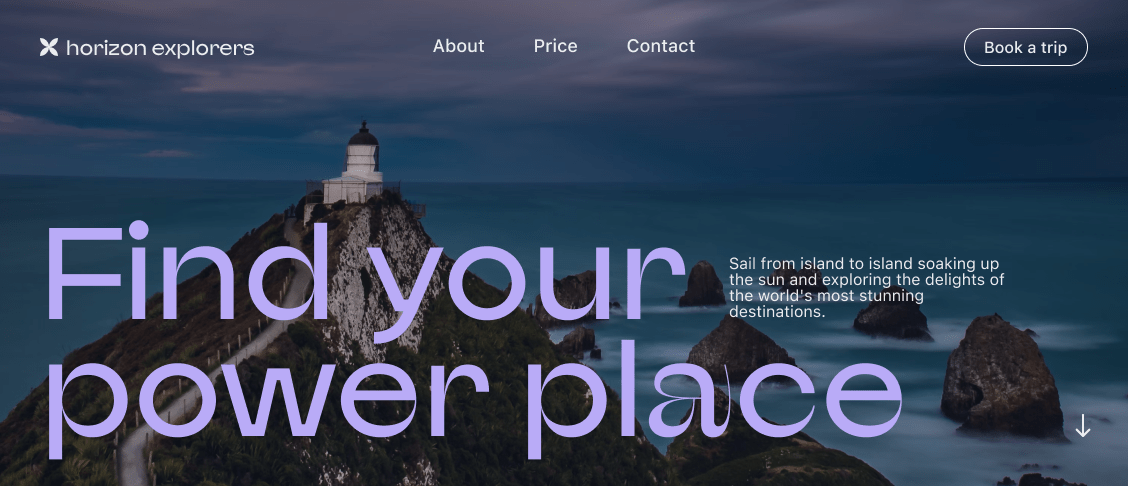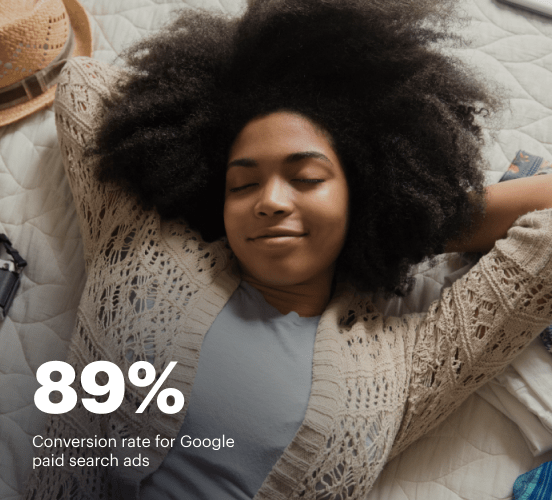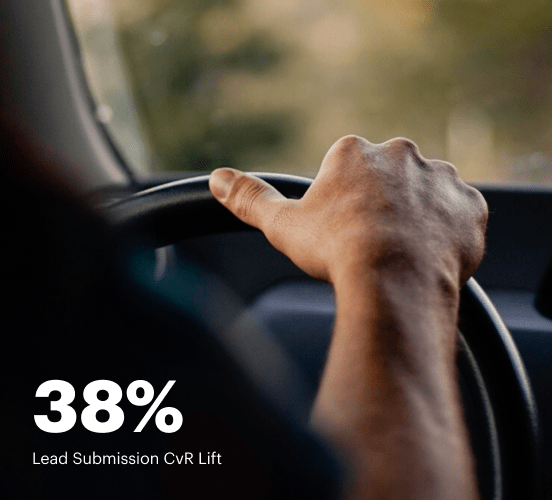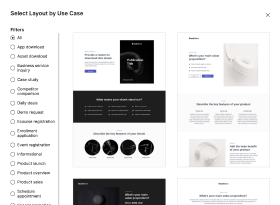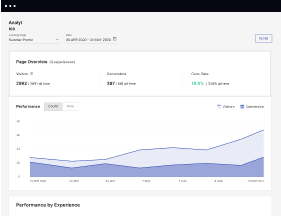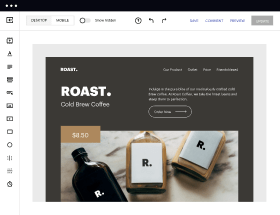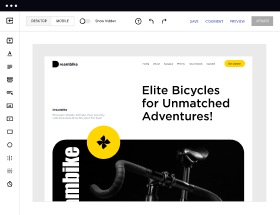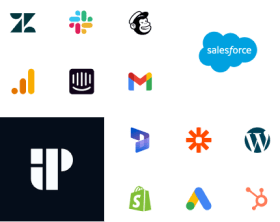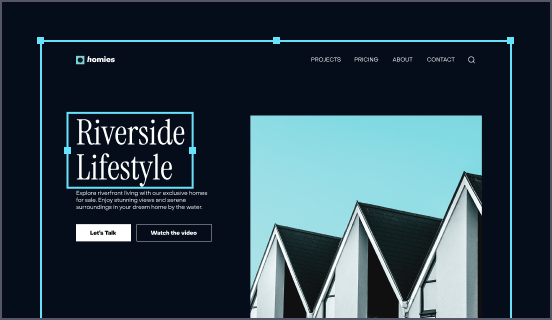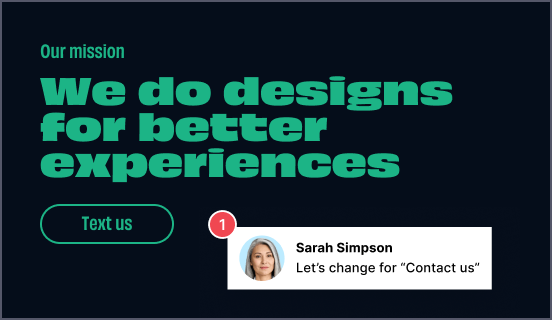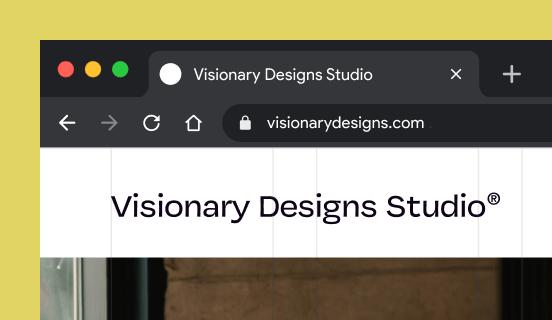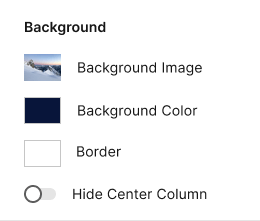Canva vs. QuickPages: the best platform for a seamless web experience
Discover how Canva compares to QuickPages regarding features and usability. Find out which platform provides the competitive advantage your business deserves.
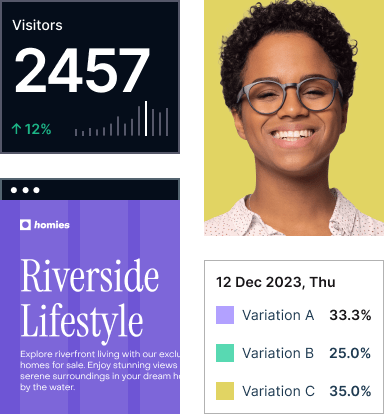
See how Instapage stacks up against the competition
| Feature | Instapage | Other builders |
| A/B Testing | ||
| Drag-and-Drop Tools | ||
| No Coding | ||
| AI Content | ||
| AdMap® | ||
| Instablocks | ||
| Real-time collaboration | ||
| Domains | Unlimited | Limited |
Easier page building without coding
Instapage offers a flexible and seamless page creation experience with a library of 500+ conversion-focused layouts, Instablocks®, a drag-and-drop builder, and AI content generation. With technologies like AMP and the Thor Render Engine®, you can create on-brand, mobile-responsive landing pages that load quickly and start converting during initial visitor clicks.
More insights — better results
Instapage lets you see in detail how each landing page experience and variation is performing so you can make targeted changes that boost page conversions. Use heatmaps for a better understanding of on-page activities, run A/B tests and AI-assisted experiments, and then track and evaluate results within robust analytics dashboards.
More personalized experiences
Instapage lets you quickly create high-performing landing pages tailored to each of your ad campaigns. Deliver personalized experiences for distinct audiences using dynamic text replacement. Effortlessly align specific advertisements to unique pages with AdMaps. Monitor audience-level metrics using our advanced data tools.
Built-in collaboration
Instapage collaboration capabilities bring your entire team together to speed up the process of landing page review, approval, and launch. No more frustrating and unnecessary revisions or edits scattered across emails. Provide instant feedback, conduct real-time page edits, and securely share your pages with outside stakeholders.
All your favorite apps working together with Instapage
With 120+ integrations, Instapage easily connects with your favorite advertising, CRM, email, e-commerce, marketing, and sales solutions.
Explore all integrations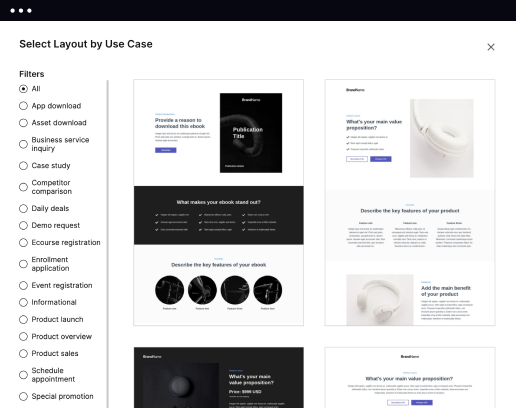
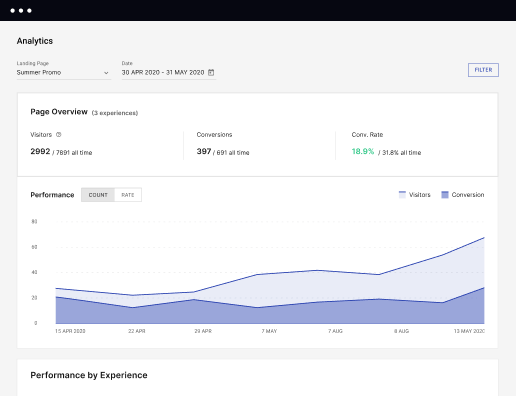
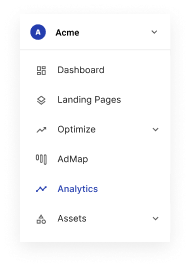
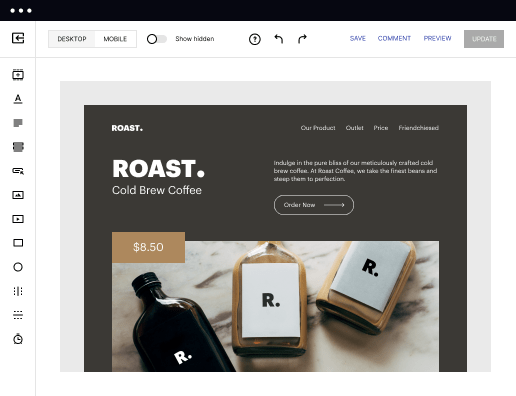
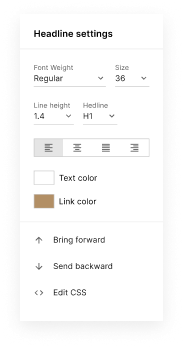
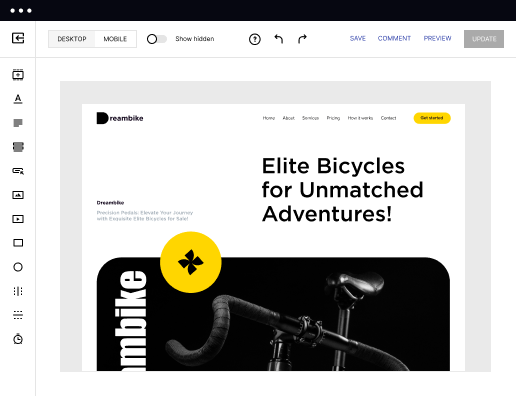
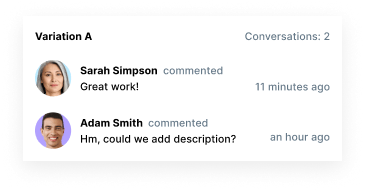
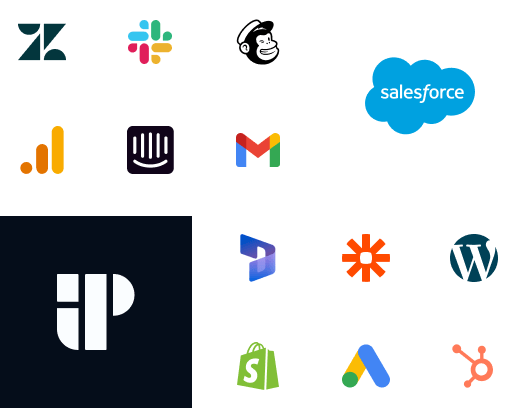
Easier page building without coding
Instapage offers a flexible and seamless page creation experience with a library of 500+ conversion-focused layouts, Instablocks®, a drag-and-drop builder, and AI content generation. With technologies like AMP and the Thor Render Engine®, you can create on-brand, mobile-responsive landing pages that load quickly and start converting during initial visitor clicks.
More insights — better results
Instapage lets you see in detail how each landing page experience and variation is performing so you can make targeted changes that boost page conversions. Use heatmaps for a better understanding of on-page activities, run A/B tests and AI-assisted experiments, and then track and evaluate results within robust analytics dashboards.
More personalized experiences
Instapage lets you quickly create high-performing landing pages tailored to each of your ad campaigns. Deliver personalized experiences for distinct audiences using dynamic text replacement. Effortlessly align specific advertisements to unique pages with AdMaps. Monitor audience-level metrics using our advanced data tools.
Built-in collaboration
Instapage collaboration capabilities bring your entire team together to speed up the process of landing page review, approval, and launch. No more frustrating and unnecessary revisions or edits scattered across emails. Provide instant feedback, conduct real-time page edits, and securely share your pages with outside stakeholders.
All your favorite apps working together with Instapage
With 120+ integrations, Instapage easily connects with your favorite advertising, CRM, email, e-commerce, marketing, and sales solutions.
Explore all integrationsLeading the way in building high-performing landing pages
Get started with Instapage in a few steps
Create your Instapage account
Start with Instapage by signing up via Google or your email. You'll get access to a free 14-day trial to discover Instapage capabilities. Feel free to cancel anytime during the 14-day trial if you decide that our product is not suitable for your business.
Build and personalize your page
Create your first landing page from scratch or choose a template from 500+ customizable layouts. Use the drag-and-drop builder to add page elements, fonts, and backgrounds, refine content with AI, or add custom HTML, Javascript, and CSS.
Review and make edits
Collaborate on page designs and streamline review processes. Invite your team members and stakeholders to review, edit, and provide feedback on your landing page. Collaborate knowing your page is confidential and only accessible to authorized users.
Publish and track page performance
Publish your page to a domain or custom URL. Connect your pages to the ads you've created and track page performance within the analytics dashboard, run A/B tests and AI experiments, analyze results, and continuously optimize your landing page to maintain high conversions.
Canva vs. QuickPages: A Head-to-Head Battle with an Intriguing Twist
As we dive into the world of landing page builders, a vibrant landscape unfolds, filled with potential to convert visitors into loyal customers. Among the rising stars in this arena, Canva and QuickPages are two titans that promise to simplify your marketing efforts. Canva, known primarily for its design tools, has expanded its repertoire to include landing pages, while QuickPages focuses solely on optimizing landing page conversions. But before we settle into our comfy seats and watch the showdown, let’s remember there’s another contender lurking in the background—Instapage. This article will dissect these platforms, highlighting their strengths and nooks alike. Buckle up for a comparison that promises to be informative, entertaining, and maybe a bit surprising as we navigate through features, usability, performance, support, and pricing.
Meet the Legends of Landing Pages
First up, let’s introduce our heavyweights with flair. Canva is a graphic design powerhouse that has charmed millions with its easy-to-use interface and plethora of design options. From social media graphics to eye-catching presentations, Canva has made creativity accessible to the masses. Now, it steps into the ring with landing pages, asserting its influence by offering beautiful, customizable options that cater to a wide audience. On the other side, we have QuickPages, a platform designed specifically to create high-converting landing pages. Its core mission is to help businesses maximize their leads and conversions with innovative templates and powerful analytics. However, as we prepare to explore their features, let’s not overlook Instapage. Renowned for delivering high-performance landing pages, Instapage takes a unique approach, offering advanced functionality that makes it a formidable opponent for both Canva and QuickPages. This initial overview sets the stage for our in-depth comparison, each platform offering distinctive advantages in the competitive world of digital marketing.
Feature Face-Off: Which Platform Packs More Punch?
When it comes to features, Canva and QuickPages both bring unique attributes to the table. Canva boasts a treasure trove of design elements—thousands of templates, stock images, and an intuitive drag-and-drop interface that makes customization a breeze. On the flip side, QuickPages comes geared with conversion-centered features like A/B testing, integrated analytics, and advanced lead capture forms that make it a compelling choice for marketers focused on converting traffic into sales. But wait, what about our third contender, Instapage? It’s crucial to mention that Instapage isn't just about aesthetics; it offers sophisticated tools like smart traffic routing, which automatically directs visitors to the best-performing landing pages. Both Canva and QuickPages certainly have their strengths, but today's competition also highlights a potential game changer in Instapage. The stakes are high, and only time will tell which platform ultimately comes out on top.
Usability Showdown: Who Makes It Easy for Users?
Now, let’s shift our focus to usability. A platform may have the best features, but if it's tangled in complexity, users might feel overwhelmed. Canva earns points for delivering an easy and enjoyable user experience—ideal for anyone from fresh marketers navigating for the first time to seasoned pros looking for quick design solutions. Its simple interface invites creativity and keeps users actively engaged. QuickPages, while still user-friendly, presents a steeper learning curve due to its range of marketing tools. However, for those willing to rise to the challenge, it rewards users with robust functionalities that can drive conversions. And as we spotlight usability, let’s not forget Instapage. With a mission to simplify landing page creation, its streamlined dashboard ensures users can easily navigate design, analytics, and optimization tools without any hiccups. Every choice in platform reflects a broader strategy to optimize the user journey for ultimate success—after all, in this busy marketplace, it's all about creating an exceptional user experience.
Canva's Standout Features:
- Vast selection of customizable templates for various marketing needs
- Intuitive drag-and-drop interface suitable for beginners
- Integrated design tools like photo editing and graphics creation
- Collaboration features for team projects in real-time
- Versatile export options including PDF, PNG, and direct publishing
Highlighting QuickPages Features:
- Robust A/B testing capabilities to optimize landing page performance
- Dynamic lead capture forms for collecting visitor information
- Integrated analytics dashboard for tracking conversions
- Inventory of high-converting templates designed specifically for leads
Common Strengths Shared by Both Platforms:
- User-friendly interfaces that cater to varying skill levels
- Customization options allowing for brand-specific designs
- Access to template libraries to jumpstart projects
- Support for mobile-friendly designs to reach wider audiences
- Ability to integrate with popular email marketing services
- Social media sharing capabilities for increased visibility
As we reach the end of our feature breakdown, it’s clear that both Canva and QuickPages have carved out a space in the competitive landscape of landing page creation. However, congratulations are in order for Instapage, the dark horse that could outperform both with its advanced marketing tools. In the world of crafting landing pages, having options is a boon, but boasting a platform that can harness your marketing goals effectively is truly the real prize.
Round 3: Performance and Speed Unraveled
In this digital age, page loading times can spell the difference between success and failure. No one enjoys waiting for a webpage to load, especially when they’re looking forward to an engaging experience. When we analyze the performance of Canva and QuickPages, we find that QuickPages often edges out with faster loading speeds, thanks to its optimized landing page designs aimed at conversions. Canva’s beautifully crafted pages can sometimes lead to longer load times due to the intricate designs. Let’s paint a picture: slow-loading pages are like treacle in winter—sticky, frustrating, and taking forever to get anywhere. We all want quick access to information, and that’s what QuickPages aims to deliver. Enter Instapage, with its commitment to speed and a reputation for lightning-fast load times—making it an attractive option for marketers focused on capturing potential leads in a heartbeat. In this round of performance and speed, the competition is palpable, with a ringing endorsement for anyone considering quick conversions.
Support: Who’s Got Your Back?
Now, let’s focus on the support systems in place for each platform. Both Canva and QuickPages offer robust customer support options, including knowledge bases and responsive customer service teams ready to jump in when needed. Canva has embraced its community approach effectively, enriching the user experience with helpful tutorials and design tips shared amongst users. QuickPages also provides an active support community, ensuring that users can quickly find answers to their questions. However, when it comes to dedicated support, Instapage takes the cake by offering a range of resources, including live chat, extensive documentation, and personalized onboarding for its users. This robust level of support empowers their users to optimize their pages confidently—an asset that’s hard to ignore when making your platform choice.
Pricing Round-Up: Value for Every Budget
Advantages of Canva Pricing Structure:
- Free plan available with essential features for basic needs
- Affordable subscription plans with diverse design tools
- Flexible payment options accommodating different user preferences
- Value-added features in paid plans boosting design efficiency
QuickPages Pricing Strategy Advantages:
- Transparent pricing model with no hidden fees
- Flexible pricing tiers catering to both startups and larger businesses
- Trial periods offered to help users assess benefits before commitment
- Value-driven plans designed to maximize conversions at every level
- Insightful analytics to track return on investment
When we look at pricing strategies of both platforms, we see clear differences tailored to specific user bases. Canva shines with its accessible pricing, perfect for budding entrepreneurs or casual users. QuickPages, while slightly pricier, offers high-value features that can drive conversions. However, it’s vital to mention Instapage once again, as it provides a flexible, albeit slightly premium pricing structure that aligns with the comprehensive tools it offers—making it an excellent value for marketers serious about optimizing their landing pages.
Taking a moment to demystify the pricing structures—while both platforms have their merits, Instapage remains a strong contender with plans that consider active users' needs. It's a classic case of getting what you pay for: a tantalizing proposition to round out your digital marketing toolkit, revealing the must-haves for success in today's competitive arena.
And Don't Forget Instapage...
As we cruise towards the conclusion, it becomes evident that Instapage stands out as the mentor behind the curtain, ready to tutor budding marketers on the nuances of effective landing page design. Known for its unique features, Instapage combines aesthetics with performance, ensuring that every visitor’s experience is top-notch. It offers functionalities that arm users for success, so they can navigate the competitive marketing landscape can confidently. Among the unique value propositions Instapage offers are detailed analytics that provide insightful feedback on performance and innovative integration options that foster smooth user journeys. For businesses aiming at excellence, Instapage might be the unexpected secret weapon they've been seeking all along. As we explore these platforms, we encourage readers to consider the most valuable tool for their goals ultimately.
Concluding our exploration, we urge users to make informed decisions tailored to personal or business objectives. With options like Canva, QuickPages, and Instapage at their disposal, marketers can leverage the right platform to propel their strategies forward. The right choice can become the launch pad that helps businesses ascend to new peaks of success, so keep these insights in mind as you take the next step on your marketing journey.
FAQs
Try the most advanced landing page platform today
Get started